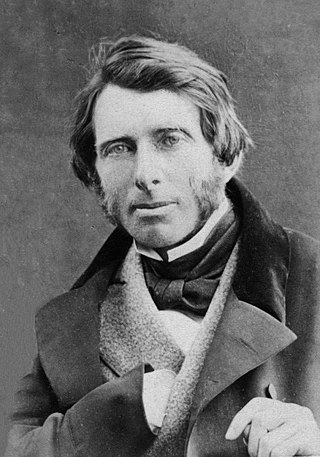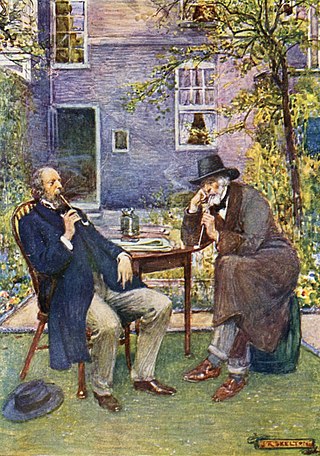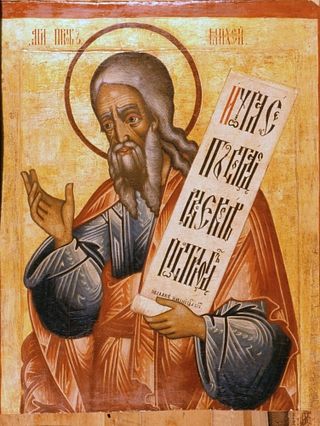Related Research Articles
The Book of Jeremiah is the second of the Latter Prophets in the Hebrew Bible, and the second of the Prophets in the Christian Old Testament. The superscription at chapter Jeremiah 1:1–3 identifies the book as "the words of Jeremiah son of Hilkiah". Of all the prophets, Jeremiah comes through most clearly as a person, ruminating to his scribe Baruch about his role as a servant of God with little good news for his audience.

In religion, a prophet or prophetess is an individual who is regarded as being in contact with a divine being and is said to speak on behalf of that being, serving as an intermediary with humanity by delivering messages or teachings from the supernatural source to other people. The message that the prophet conveys is called a prophecy.

Apocalypse is a literary genre in which a supernatural being reveals cosmic mysteries or the future to a human intermediary. The means of mediation include dreams, visions and heavenly journeys, and they typically feature symbolic imagery drawn from the Hebrew Bible, cosmological and (pessimistic) historical surveys, the division of time into periods, esoteric numerology, and claims of ecstasy and inspiration. Almost all are written under pseudonyms, claiming as author a venerated hero from previous centuries, as with the Book of Daniel, composed during the 2nd century BCE but bearing the name of the legendary Daniel.

Jeremiah, also called Jeremias or the "weeping prophet", was one of the major prophets of the Hebrew Bible. According to Jewish tradition, Jeremiah authored the Book of Jeremiah, the Books of Kings and the Book of Lamentations, with the assistance and under the editorship of Baruch ben Neriah, his scribe and disciple.

John Ruskin was an English writer, philosopher, art critic and polymath of the Victorian era. He wrote on subjects as varied as geology, architecture, myth, ornithology, literature, education, botany and political economy.

Matthew Arnold was an English poet and cultural critic who worked as an inspector of schools. He was the son of Thomas Arnold, the celebrated headmaster of Rugby School, and brother to both Tom Arnold, literary professor, and William Delafield Arnold, novelist and colonial administrator. Matthew Arnold has been characterised as a sage writer, a type of writer who chastises and instructs the reader on contemporary social issues. He was also an inspector of schools for thirty-five years, and supported the concept of state-regulated secondary education.

Thomas Carlyle was a British essayist, historian, and philosopher from the Scottish Lowlands. A leading writer of the Victorian era, he exerted a profound influence on 19th-century art, literature, and philosophy.

Walden is a book by American transcendentalist writer Henry David Thoreau. The text is a reflection upon the author's simple living in natural surroundings. The work is part personal declaration of independence, social experiment, voyage of spiritual discovery, satire, and—to some degree—a manual for self-reliance.

"Ulysses" is a poem in blank verse by the Victorian poet Alfred, Lord Tennyson (1809–1892), written in 1833 and published in 1842 in his well-received second volume of poetry. An oft-quoted poem, it is a popular example of the dramatic monologue. Facing old age, mythical hero Ulysses describes his discontent and restlessness upon returning to his kingdom, Ithaca, after his far-ranging travels. Despite his reunion with his wife Penelope and his son Telemachus, Ulysses yearns to explore again.
Apocalyptic literature is a genre of prophetical writing that developed in post-Exilic Jewish culture and was popular among millennialist early Christians. Apocalypse is a Greek word meaning "revelation", "an unveiling or unfolding of things not previously known and which could not be known apart from the unveiling".

Wisdom literature is a genre of literature common in the ancient Near East. It consists of statements by sages and the wise that offer teachings about divinity and virtue. Although this genre uses techniques of traditional oral storytelling, it was disseminated in written form.

Victorian literature refers to English literature during the reign of Queen Victoria (1837–1901). The 19th century is considered by some to be the Golden Age of English Literature, especially for British novels. It was in the Victorian era that the novel became the leading literary genre in English. English writing from this era reflects the major transformations in most aspects of English life, from scientific, economic, and technological advances to changes in class structures and the role of religion in society. Famous novelists from this period include Charles Dickens, William Makepeace Thackeray, the three Brontë sisters, George Eliot, Thomas Hardy and Rudyard Kipling.
George Paul Landow is Professor of English and Art History Emeritus at Brown University. He is a leading authority on Victorian literature, art, and culture, as well as a pioneer in criticism and theory of Electronic literature, hypertext and hypermedia. He also pioneered the use of hypertext and the web in higher education.
The influence of Persian literature in Western culture is historically significant. In order to avoid what E.G. Browne calls "an altogether inadequate judgment of the intellectual activity of that ingenious and talented people" (E.G.Browne, p4), many centers of academia throughout the world today from Berlin to Japan have permanent programs for Persian studies for the literary heritage of Persia.

According to the Hebrew Bible, Micah, also known as Micheas, was a prophet in Judaism and is the author of the Book of Micah. He is considered one of the Twelve Minor Prophets of the Hebrew Bible and was a contemporary of the prophets Isaiah, Amos and Hosea. Micah was from Moresheth-Gath, in southwest Judah. He prophesied during the reigns of kings Jotham, Ahaz, and Hezekiah of Judah.
Traditionalist conservatism, often known as classical conservatism, is a political and social philosophy that emphasizes the importance of transcendent moral principles, manifested through certain natural laws to which society should adhere prudently. Traditionalist conservatism is based on Edmund Burke's political views. Traditionalists value social ties and the preservation of ancestral institutions above excessive individualism.

Daniel is the main character of the Book of Daniel. According to the Hebrew Bible, Daniel was a noble Jewish youth of Jerusalem taken into captivity by Nebuchadnezzar II of Babylon, serving the king and his successors with loyalty and ability until the time of the Persian conqueror Cyrus, all the while remaining true to the God of Israel. While some conservative scholars hold that Daniel existed and his book was written in the 6th century BCE, most scholars agree that Daniel is not a historical figure and that much of the book is a cryptic allusion to the reign of the 2nd century BCE Hellenistic king Antiochus IV Epiphanes.
English literature is literature written in the English language from the United Kingdom, its Crown Dependencies and Overseas Territories, the Republic of Ireland, the United States, and the countries of the former British Empire. The English language has developed over the course of more than 1,400 years. The earliest forms of English, a set of Anglo-Frisian dialects brought to Great Britain by Anglo-Saxon invaders in the fifth century, are called Old English. Beowulf is the most famous work in Old English, and has achieved national epic status in England, despite being set in Scandinavia. However, following the Norman conquest of England in 1066, the written form of the Anglo-Saxon language became less common. Under the influence of the new aristocracy, French became the standard language of courts, parliament, and polite society. The English spoken after the Normans came is known as Middle English. This form of English lasted until the 1470s, when the Chancery Standard, a London-based form of English, became widespread. Geoffrey Chaucer, author of The Canterbury Tales, was a significant figure in the development of the legitimacy of vernacular Middle English at a time when the dominant literary languages in England were still French and Latin. The invention of the printing press by Johannes Gutenberg in 1439 also helped to standardise the language, as did the King James Bible (1611), and the Great Vowel Shift.
Matthew 27:9-10 are the ninth and tenth verses of the twenty-seventh chapter of the Gospel of Matthew in the New Testament. These verses end the final story of Judas Iscariot, with a quotation from scripture showing how the events around his final days were predicted.

Thomas Carlyle believed that his time required a new approach to writing:
But finally do you reckon this really a time for Purism of Style; or that Style has much to do with the worth or unworth of a Book? I do not: with whole ragged battallions of Scott's-Novel Scotch, with Irish, German, French and even Newspaper Cockney storming in on us, and the whole structure of our Johnsonian English breaking up from its foundations,—revolution there as visible as anywhere else!
References
- Holloway, John. The Victorian Sage: Studies in Argument. London: Macmillan, 1953.
- Landow, George. Elegant Jeremiahs: The Sage from Carlyle to Mailer. Ithaca, New York: Cornell University Press, 1986.
- Eds. Levine, George and Madden, William. The Art of Victorian Prose NY: Oxford University Press, 1968.
- Thais E. Morgan, Victorian Sages and Cultural Discourse: Renegotiating Gender and Power, Rutgers University Press, 1990
- Peterson, Linda H. "Sage Writing." In A Companion to Victorian Literature and Culture. Ed. Herbert F. Tucker. Boston: Blackwell Publishers Ltd., 1999.
- The Victorian Web.
